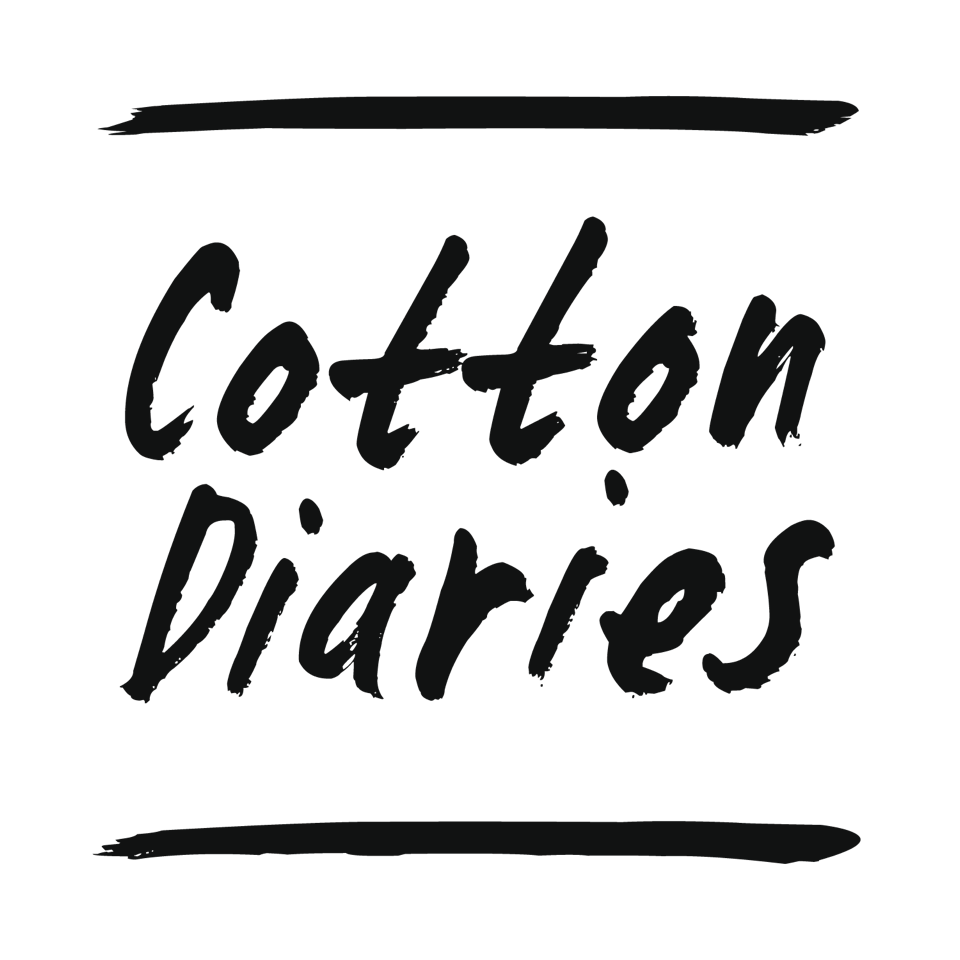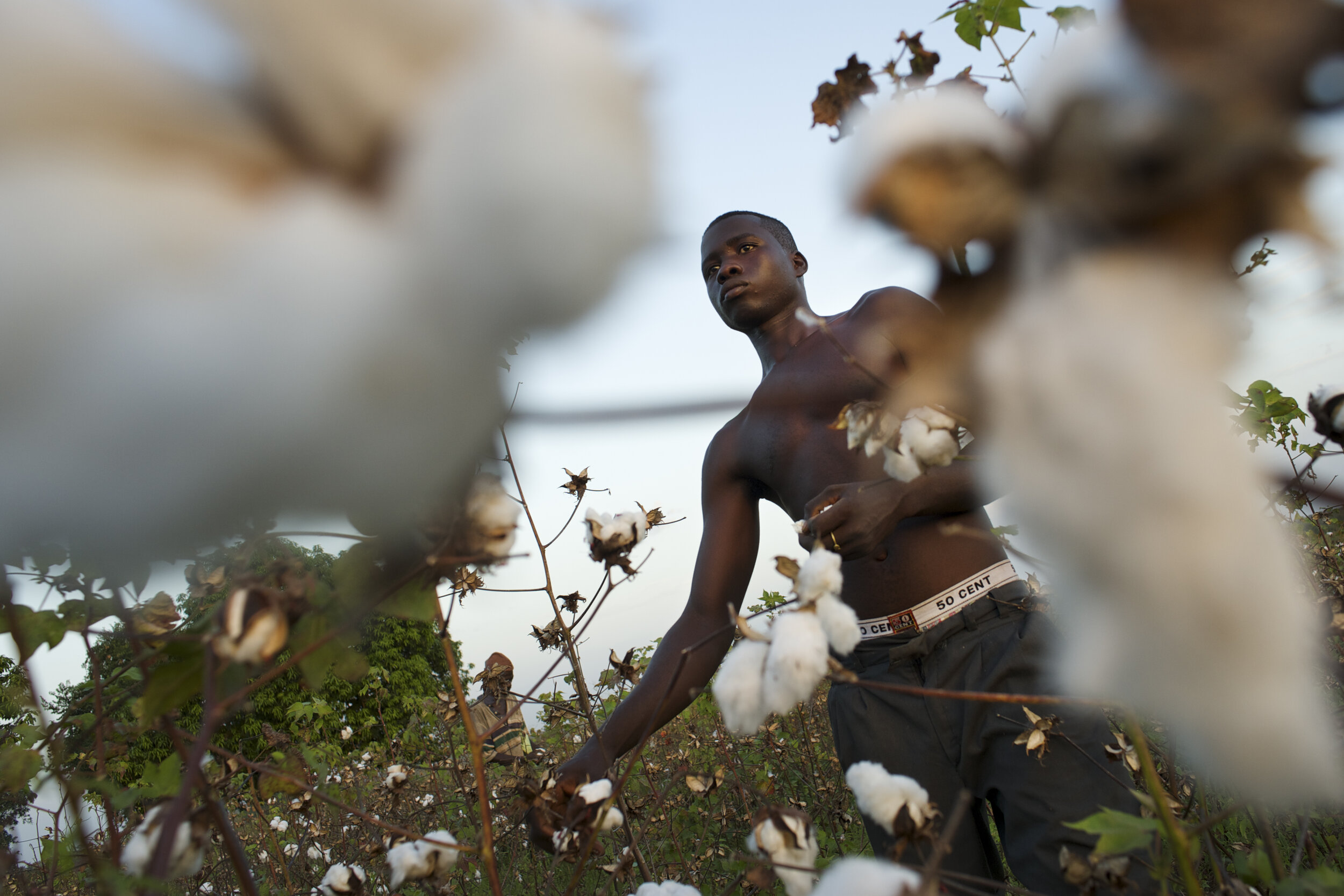Visual storyteller Uwe H. Martin is exploring the human and environmental impacts of global cotton production through his multimedia documentary project White Gold.
uwe’s journey
Before Uwe studied photography and journalism, he backpacked around Asia and fell in love with Bangladesh. Throughout his studies he kept returning to the country, and even tried to do his final project on the garment industry in Bangladesh. He didn’t get funding for the project at that time, but kept researching the topic and that’s what led him to cotton, and agriculture. ‘I wanted to follow the entire garment chain, starting with cotton on the field. But then I figured out that agriculture is actually much more interesting than just following a garment. Following a garment was nothing new — there are books about following a t-shirt or pair of jeans. But there were very few visual storytellers really diving deep into agriculture even though agriculture is the largest industry we have in the world. There's nothing else that employs so many people. Agriculture is by far the most important thing that we as human beings are collectively doing to the planet — it’s the largest driver of species extinction, water depletion, soil erosion, contributes nearly a quarter to global climate change, and so on, so forth. Many historic societies have broken down because their agriculture killed their environment. That's why I kept exploring agriculture.’
One of the outputs of this exploration is White Gold, a research and documentary project that examines the social and ecological effects of global cotton production in five regions in the world: Uzbekistan and Kazakhstan, India, Burkina Faso, Texas, and Brazil. The main reporting was done on the ground between 2006 and 2012 but Uwe has been keeping the work up to date since then.
‘I'm a person who wants to do the research myself and really tell the story. And with that comes working really slowly over an extended period of time. My partner and I spend months diving deep into a project often returning time and again to provide a look that spans a period rather than a single moment in time. We publish our stuff in magazines, and newspapers. We do online storytelling like a scrolled story that combines texts, photos and video, or it can be condensed into a linear film format. Then we also work on installation work, where we help people to build their own story.’
“My camera is like a passport that opens the doors to situations I normally do not belong to and that allow me to learn. My learning is condensed in images that are an entry point for others’ learning.”
THE PROBLEMS uwe IS TACKLING
White Gold ‘TexasBlues’ chapter (documented on the ground in 2008/09 and updated in 2017) looks at the highly industrialized cotton farms in Western Texas and the system of excessive subsidies that keeps them afloat. ©Uwe H.Martin
The vast impacts of global cotton production. ‘Cotton is the fiber of our life, it’s a fiber of industrialization, and the basic fiber of why we live in societies like we do now. Our hygiene products are cotton, US dollars are printed on cotton, even our filter coffee goes through cotton. At the same time, it is a fiber that creates so many environmental challenges. It uses more pesticides than almost anything else. Because it's now grown so much in dry regions, it creates huge water problems. And the cotton market doesn’t really work. I was surprised that even farmers in Texas who have gotten more than a million dollars in subsidies have trouble surviving on cotton. Even the biggest farmer I met in Texas who had the most modern machines, and was always the most innovative in everything, gets million-dollar subsidies because it's so expensive to keep running this operation and the margins are so slim. Cotton is highly changed by subsidies — subsidised financially in Europe or the United States, or subsidized by the life of people in places like India where hundreds of thousands of people are killing themselves, or subsidized by how we treat the environment — all to keep cotton cheap.
‘LandRush – The Road’ follows the extension of the Soy Highway in Western Brazil, which drives the agricultural boom ever deeper into the Amazon basin. It is part of the larger Land Rush project about global agriculture, water, seeds, and land. ©Uwe H.Martin
The fact that consumers often struggle to see how they’re connected to cotton. ‘There are a million things people could care about. The questions they ask are: Why is it relevant for me? Why should I care? Should I care that I don't know? For someone who doesn't even talk to their neighbours on the other side of the street, it's very abstract and hard to care about a poor farmer in India who is seemingly worlds apart. There's a lot of criticism, and rightly so, of so-called 'dramatic media' but the question remains how do you get people to start caring about something if they don't have a personal connection to the issue? In a perfect world people could meet the farmer who makes the material the shirt they’re buying is made from. That might make someone wonder if that farmer should really just earn $1 a day for the beautiful shirt. Maybe we could make people care like that. But otherwise, it's very abstract and hard to get people to care about someone on the other side of the world. But it's important that our society cares, because our overconsumption has a significant impact on the lives of the people in the Global South.’
uwe’s SOLUTIONS
White Gold ‘DyingSea’ chapter (documented on the ground in 2007 and updated in 2018) investigates the drying of the Aral Sea in Central Asia. White Gold is part of the larger @landrushproject that investigates global agriculture since 2007. ©Uwe H.Martin
Focusing on the human side of global cotton production. ‘In general, people care not about numbers, but about other human beings. And so what we are always trying to do is find a common thing that you, as the audience, can relate to, on a personal level. We focus on struggles that feel universal, trying to find something behind the specific story of one cotton farmer that any person in a wealthy country can relate to. No matter where you are, you know what it feels like to be afraid of your parents dying, or dealing with the loss of someone you love, or lying to someone in order not to hurt them. Finding this kind of common ground helps people connect.’
White Gold ‘Burkina Dream’ chapter (documented on the ground in 2009 and updated in 2017) considers the hope and challenges of small-scale organic farmers at the very moment Burkina Faso introduces genetically modified cotton nationwide. White Gold is part of the larger @landrushproject that investigates global agriculture since 2007. ©Uwe H.Martin
Acting as a translator between experts and consumers. ‘I see my role as a kind of translator between the experts who know everything, and to people who don't know a lot or nothing about the story in the beginning. People who have too much insight into something often aren’t able to put themselves into the shoes of somebody who has no clue and so can get lost in details that the general public cannot relate to. For example, with academics, using language that helps you raise your profile within academia, amongst your peer group, can exclude everybody else. I don't understand every detail about cotton, but that helps me to do this translation’
White Gold ‘Burkina Dream’ chapter. White Gold is part of the larger @landrushproject that investigates global agriculture since 2007. ©Uwe H.Martin
Introducing complexities slowly. ‘If I have to communicate with a large group of say 200,000 people reading a magazine, I’ll write it so they can understand it in 10 to 20 minutes of reading time. Maybe one in twenty of those readers might go and look at the online films that present a personal story and go deeper into the topic. And maybe 100 of those people come to an exhibition or buy a book and really get into the complexity of the problem. That's why we built bridges between these different entry points, so step-by-step, we can add layers of complexity.’
Learning from farmers on the ground. ‘I love farmers and think the cultures around farming are amazing. That's why I spend so much time with farmers. Farmers, ranchers, fishermen — all of them — have a very deep connection and understanding to the land or to the environment that they are working with. They have an expertise that many people at NGOs and environmental organizations, who are traditionally considered as experts in the media, don't have because they don't work with the soil, or with the water or with the land themselves. I think very much that farmers could hold solutions to a lot of problems, but they do not always get the best available information because it’s filtered through interest groups, or they are prevented from applying solutions due to cultural or economic pressures.’
LandRush - Ventures into global agriculture. Exhibition by Frauke Huber & Uwe H. Martin. From March 20 to August 29, 2021, Luxembourg.
Taking the viewer on a journey through the landscapes and realities of modern agriculture with multimedia installations. ‘LandRush – Ventures into Global Agriculture is our largest exhibition to date just opened on March 20, 2021 at the Pomhouse of the Centre national de l’audiovisuel (CNA) in Luxemburg. For the first time it brings together all three chapters [WhiteGold, LandRush and DryWest] of our ongoing investigation into global agriculture - a journey that I started in collaboration with my partner Frauke Huber in 2007. ‘
uwe x cotton diaries
At Cotton Diaries we collaborated closely with Uwe to create a newsletter series to share stories from around the world exploring the social and ecological consequences of global cotton farming. Sign up here to receive it.
Learn more
Where can I see Uwe’s latest exhibition?
What is slow journalism?
How do I find out more about Uwe’s projects?
Where can I follow his work?
Greetings from: Hamburg, Germany and Bombay Beach, United States
Thanks to the Instagram hashtags #whitegold for introducing us to Uwe’s story :)
*The views, thoughts, and opinions expressed in the text belong solely to the solution-provider, and not necessarily to the entire Cotton Diaries community. You can find full disclaimer information here.








